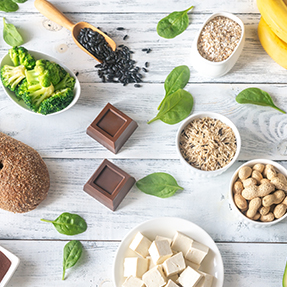
Magnesium-rich foods found beneficial for brain health
Although a cure for Alzheimer’s disease and other types of dementia is not available, we can still take action. There is substantial evidence that lifestyle choices can aid in preventing or delaying cognitive decline. As we wait for new treatments to emerge, current research provides valuable guidance for maintaining cognitive function and keeping our brains healthy.
Magnesium is a mineral that lately gained attention for its potential brain-boosting benefits as you age
A 2023 study published in the European Journal of Nutrition found that consuming more magnesium from dietary sources may help promote better brain health. Researchers examined over 6,000 participants aged 40 to 73 to investigate the connection between diets rich in magnesium-containing foods and brain volume. The results showed that consuming more magnesium-rich foods was linked to larger brain volumes, particularly among women.
It’s worth noting that the study doesn’t provide a definitive cause-and-effect relationship. Still, it suggests that incorporating more magnesium-rich foods into one’s diet could positively impact cognitive function and brain health. Leafy green vegetables, legumes, nuts, seeds, dark chocolate of at least 70% cacao content, and whole grains are examples of foods that are not only loaded with magnesium but also contain other essential nutrients that contribute to overall good health. Whether it’s the magnesium itself or a combination of factors responsible for the observed association with brain health, consuming these foods instead of less healthy options is always a smart decision.
If you want to consume more magnesium-rich foods, a good place to start is by cutting back on ultra-processed foods like chips, TV dinners, and donuts. Instead, try incorporating more whole, minimally processed plant-based foods into your diet. Here are some suggestions to help you get started:
- Eat a leafy green salad daily. Leafy greens include spinach, arugula, kale, Swiss chard, and broccoli.
- Choose more whole grains, such as farro, oatmeal, and brown rice, and less refined grains, such as pastries and white bread.
- Snack on a handful of nuts once a day or sprinkle them on salads or whole grain cereals. All nuts are healthy, so choose walnuts, pistachios, almonds, cashews, and pecans.
- Have two squares of dark chocolate of at least 70% cacao content daily
- Add beans and lentils to soups, stews, salads, and dips
Dr. David Samadi is the Director of Men’s Health and Urologic Oncology at St. Francis Hospital in Long Island. He’s a renowned and highly successful board certified Urologic Oncologist Expert and Robotic Surgeon in New York City, regarded as one of the leading prostate surgeons in the U.S., with a vast expertise in prostate cancer treatment and Robotic-Assisted Laparoscopic Prostatectomy. Dr. Samadi is a medical contributor to NewsMax TV and is also the author of The Ultimate MANual, Dr. Samadi’s Guide to Men’s Health and Wellness, available online both on Amazon and Barnes & Noble. Visit Dr. Samadi’s websites at robotic oncology and prostate cancer 911.
